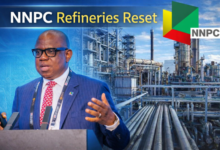Coronation Infrastructure Fund Debuts on NGX with ₦8.79bn Listing to Power Nigeria’s Growth

The Nigerian Exchange (NGX) has welcomed a new milestone in alternative investments with the official listing of the Coronation Infrastructure Fund (CIF). The ₦8.79 billion fund, managed by Coronation Asset Management Ltd., a subsidiary of Coronation Group, is being positioned as a catalyst for infrastructure-led growth and long-term capital mobilisation in Nigeria.
A Category-Defining Fund
The CIF listing comprises 87.9 million units at ₦100 per unit, instantly creating an accessible and liquid product for investors seeking exposure to infrastructure as an asset class.
Aigbovbioise Aig-Imoukhuede, CEO of Coronation Asset Management, described the listing as a category-defining moment for Nigeria’s capital market, one that democratises infrastructure investing.
“The Coronation Infrastructure Fund is not just an investment product—it is a transformational vehicle. It directs long-term capital into critical sectors like transport, energy, housing, and utilities while generating sustainable wealth for investors,” he said.
From Vision to Execution
CIF first made headlines in 2024 when it achieved the largest Series I capital raise for an infrastructure fund in Nigeria. Now, with its NGX listing, the fund moves from the private capital space into the public markets, opening participation to a wider pool of investors, from institutions to retail players.
Mayowa Ikotun, Head of CIF at Coronation Asset Management, highlighted the fund’s strong early performance:
- Already distributing ₦1.7 billion in dividends.
- Established track record across transportation, energy, real estate, and utilities.
- Recognised as Nigeria’s Best Performing Maiden Infrastructure Fund.
Ikotun emphasised CIF’s dual appeal: capital preservation and steady semi-annual income, wrapped in a product aligned with impact investing principles.
Why CIF Matters in Nigeria’s Economic Landscape
Nigeria’s infrastructure deficit is well documented. From underdeveloped roads and rail to insufficient housing and power capacity, the World Bank estimates the country requires over $100 billion annually for the next decade to bridge the gap.
Traditional funding sources—government budgets and multilateral loans—remain insufficient. This is where infrastructure funds like CIF step in, offering:
- Capital mobilisation at scale through public markets.
- Private sector participation in critical development projects.
- De-risked investment structures that blend returns with impact.
- Investor diversification beyond equities and fixed income.
In essence, CIF represents the institutionalisation of infrastructure as an investable asset class in Nigeria, something the market has long clamoured for.
Democratizing Infrastructure Investing
Beyond numbers, CIF signals a new era: democratised access to infrastructure. By lowering the entry barrier through NGX, the fund makes it possible for ordinary investors to participate in projects that shape national development.
“This is what we do at Coronation—we turn vision into investable outcomes. With CIF, we’re building a continuum of opportunity that bridges capital and country, purpose and performance,” Ikotun added.
With plans already underway for a Series II issuance, Coronation is intent on scaling impact while attracting broader pools of domestic and international investors.
BRANDECONOMY Takeaway
The listing of the ₦8.79bn Coronation Infrastructure Fund on NGX is more than a capital market event—it is a structural shift. It validates infrastructure as a viable investment vehicle, aligns with Nigeria’s push for non-oil economic diversification, and signals growing sophistication in the country’s asset management industry.
If executed effectively, CIF could catalyse a wave of similar instruments, channelling billions into roads, power, housing, and utilities—sectors that define Nigeria’s economic future.
For investors, CIF offers not just returns but a chance to participate in nation-building through capital markets. For Nigeria, it may well be the start of an infrastructure investing revolution.












